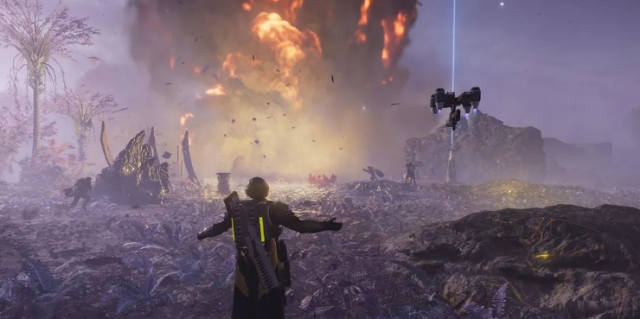
Introduction:
Arrowhead Studios’ highly anticipated sequel, Helldivers 2, has been met with controversy following a recent directive from the developers urging players to change their reviews to negative due to issues with PSN linking. In this article, we’ll explore the background of the Helldivers franchise, the details of the PSN linking problem, and why players are expressing their frustration by altering their reviews.
A Brief Overview of Helldivers:
Helldivers, the original game released in 2015, gained a dedicated following for its addictive gameplay, cooperative multiplayer mechanics, and challenging missions set in a dystopian future. Developed by Arrowhead Studios, the game received critical acclaim for its innovative design and intense action, earning praise from both players and critics alike.
The Announcement of Helldivers 2:
Fans of the franchise eagerly awaited news of a sequel, and their excitement reached a fever pitch when Arrowhead Studios officially announced Helldivers 2. Promising improved graphics, new missions, and enhanced gameplay features, the sequel generated significant buzz within the gaming community ahead of its release.
The PSN Linking Issue:
However, the launch of Helldivers 2 was marred by reports of technical issues related to PlayStation Network (PSN) linking. Many players encountered difficulties linking their PSN accounts to the game, preventing them from accessing certain features or participating in multiplayer sessions. Despite efforts to address the problem, Arrowhead Studios acknowledged that a resolution was not immediately forthcoming.
The Controversial Directive:
In response to the ongoing PSN linking issue, Arrowhead Studios made the controversial decision to encourage players to change their reviews of Helldivers 2 to negative on various platforms, including Steam and Metacritic. The developers argued that negative reviews would put pressure on Sony to prioritize fixing the PSN linking problem, thereby facilitating a quicker resolution for affected players.
Player Response and Backlash:
The directive from Arrowhead Studios sparked a wave of backlash from the gaming community, with many players expressing their frustration and disappointment with the handling of the situation. Some criticized the developers for attempting to manipulate review scores, while others questioned the effectiveness of the strategy and its potential impact on the game’s reputation.
The Ethics of Review Manipulation:
The controversy surrounding Arrowhead Studios’ directive raises important questions about the ethics of review manipulation in the gaming industry. While developers may have legitimate concerns about addressing technical issues, encouraging players to artificially inflate or deflate review scores undermines the integrity of user feedback and erodes trust between developers and their audience.
The Importance of Transparency and Communication:
Ultimately, the Helldivers 2 controversy serves as a reminder of the importance of transparency and communication between developers and players. While technical issues are an inevitable part of game development, open dialogue and proactive problem-solving are essential for maintaining trust and fostering a positive community environment.
Conclusion:
The fallout from Arrowhead Studios’ directive to change reviews to negative over the PSN linking issue has cast a shadow over the launch of Helldivers 2. As players continue to grapple with technical difficulties and navigate the complexities of review manipulation, the incident serves as a cautionary tale for developers and players alike. Moving forward, a commitment to transparency, communication, and ethical practices will be crucial for preserving the integrity of the gaming industry and fostering a healthy relationship between developers and their audience.







